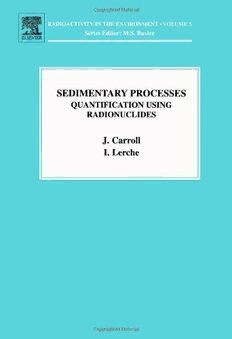Download Sedimentary processes: quantification using radionuclides PDF Free - Full Version
Download Sedimentary processes: quantification using radionuclides by JoLynn Carroll, Ian Lerche in PDF format completely FREE. No registration required, no payment needed. Get instant access to this valuable resource on PDFdrive.to!
About Sedimentary processes: quantification using radionuclides
The advent of radionuclide methods in geochronology has revolutionized our understanding of modern sedimentary processes in aquatic systems. This book examines the principles of the method and its use as a quantitative tool in marine geology, with emphasis on the Pb-210 method. The assumptions and consequences of models and their behaviour are described providing the necessary background to assess the advantages and trade-offs involved when choosing a particular model for application. One of the purposes of this volume is to disentangle the influences of complicating factors, such as sediment flux variations, post-depositional diffusion of radionuclides, and bio-irrigation of sediments, to arrive at sediment ages and to properly assess the attendant data uncertainty. Environmental impacts of chemical, nuclear, or other waste material are of concern in a variety of areas around the world today. A number of relevant examples are included, demonstrating how dating models are useful for determining sources of contaminants and interpreting their influence on the environment.The book is set at a level so that an able student or professional should have no difficulty in following the procedures and methods developed. Each chapter includes case histories showing the strengths and weaknesses of a given procedure with respect to a data example. Included with this volume is the computer source code of a new generation of modelling tools based on inverse numerical analysis techniques. This first generation of the modelling tool is included, along with detailed instructions and examples for its use, in an appendix.
Detailed Information
| Author: | JoLynn Carroll, Ian Lerche |
|---|---|
| Publication Year: | 2003 |
| ISBN: | 9780080443003 |
| Pages: | 283 |
| Language: | English |
| File Size: | 11.081 |
| Format: | |
| Price: | FREE |
Safe & Secure Download - No registration required
Why Choose PDFdrive for Your Free Sedimentary processes: quantification using radionuclides Download?
- 100% Free: No hidden fees or subscriptions required for one book every day.
- No Registration: Immediate access is available without creating accounts for one book every day.
- Safe and Secure: Clean downloads without malware or viruses
- Multiple Formats: PDF, MOBI, Mpub,... optimized for all devices
- Educational Resource: Supporting knowledge sharing and learning
Frequently Asked Questions
Is it really free to download Sedimentary processes: quantification using radionuclides PDF?
Yes, on https://PDFdrive.to you can download Sedimentary processes: quantification using radionuclides by JoLynn Carroll, Ian Lerche completely free. We don't require any payment, subscription, or registration to access this PDF file. For 3 books every day.
How can I read Sedimentary processes: quantification using radionuclides on my mobile device?
After downloading Sedimentary processes: quantification using radionuclides PDF, you can open it with any PDF reader app on your phone or tablet. We recommend using Adobe Acrobat Reader, Apple Books, or Google Play Books for the best reading experience.
Is this the full version of Sedimentary processes: quantification using radionuclides?
Yes, this is the complete PDF version of Sedimentary processes: quantification using radionuclides by JoLynn Carroll, Ian Lerche. You will be able to read the entire content as in the printed version without missing any pages.
Is it legal to download Sedimentary processes: quantification using radionuclides PDF for free?
https://PDFdrive.to provides links to free educational resources available online. We do not store any files on our servers. Please be aware of copyright laws in your country before downloading.
The materials shared are intended for research, educational, and personal use in accordance with fair use principles.

